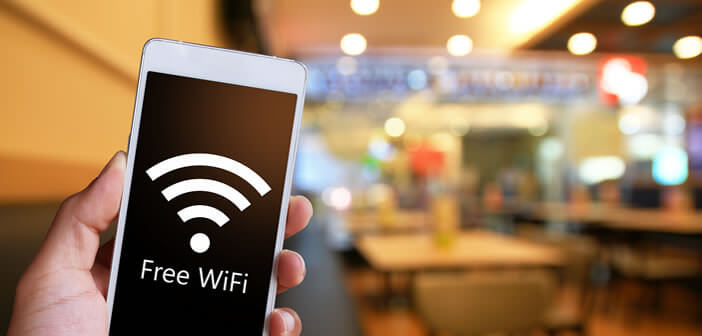
More and more hotels, cafes, restaurants, airports and also museums are making their Wi-Fi available to their customers. What is the risk of using free hotspots? What behavior to protect against the theft of personal data? TechnoWikis takes stock..
Is public Wi-Fi dangerous?
On vacation, on the move or during a stay abroad, it is very significant to be able to connect for free to the internet. It allows you to check your emails, check your notifications or post photos on Instagram without having to pay a single penny.
It is all the more tempting that the offers of free Wi-Fi hotspots have developed strongly in recent years. Local authorities, public buildings, shopping centers, railway companies offer wireless connections to their customers or passing visitors..
If you're reading this article, chances are you're one of those people who have used free hotspots before. If that reassures you, you are far from alone. It has also become a decisive decision criterion in the choice of a hotel for many consumers.
On the other hand you should know that the use of these internet terminals involves risks. Connecting to open networks is less trivial than you might think, for several reasons. First, most of these accesses have no authentication system..
This means that the data passing between your device (smartphone, computer, tablet, etc.) and Wi-Fi access can be intercepted by a third party. Hackers have tools capable of spying on your internet browsing (URL address, information transmitted using a form, email content, etc.).
In addition, these open networks offer the possibility for hackers to send you all kinds of information. For example, they can redirect you to malicious sites containing malware or virus-infected software.
But that's not all. Some hackers even go so far as to create fake Wi-Fi hotspots by giving them the name of a hotel, shopping center or fast food. This technique thus allows hackers to recover all the sites visited as well as the information entered during your navigation.
How to secure a connection to a free hotspot
With the development of HTTPS technology and SSL certificates, it has become increasingly difficult to intercept personal information. Data transmitted on sites using this type of technology is now encrypted to prevent eavesdropping by a third party.
But don't think you're safe. Since DNS queries are not encrypted, hackers always have access to your browsing history. In addition, if connected to a fake hotspot, hackers will still be able to capture your identification data.
To be sure that your data does not fall into the wrong hands, it is better to use a VPN service. This software device will encrypt all data leaving your device, including DNS queries. No hacker will have access to any of your information.
Also remember to turn off file sharing from your computer's control panel. In addition, make sure before sending sensitive information that the site you are surfing on has an HTTPS connection (small green padlock).
It is also imperative to have an up-to-date antivirus and firewall. The solutions provide permanent control of the software running on your machine. They also allow you to thwart numerous attacks.
Here are some tips to follow when connected to Public Wi-Fi
- Never access sites that store sensitive information such as bank accounts
- Always turn off file sharing on Windows
- Use a security solution such as the VPN integrated into Opera
- Turn off Wi-Fi when not in use
- Avoid unsafe free VPNs
- Share as little personal information as possible